Prophet Song, Paul Lynch’s ‘triumph of emotional storytelling’, wins the Booker Prize 2023
As Paul Lynch becomes the fifth Irish writer to win the Booker Prize, here’s everything you need to know about his winning novel, Prophet Song
Prophet Song by Paul Lynch has been announced as the winner of the Booker Prize 2023. He receives £50,000 and was presented with his trophy by Shehan Karunatilaka, last year’s winner, at a ceremony held at Old Billingsgate in London.
Prophet Song, which is Lynch’s fifth novel, is an exhilarating, propulsive and confrontational portrait of a country – and a family – on the brink of catastrophe. Ireland is in the grip of a government that is taking a turn towards tyranny and Eilish Stack, the novel’s protagonist, soon finds herself trying to make sense of the nightmare of a collapsing society – assailed by unpredictable forces beyond her control and desperate to do whatever it takes to keep her family together.
Discover more about Prophet Song here.
Why did Prophet Song win?
Esi Edugyan, Chair of the 2023 judges, said:
‘From that first knock at the door, Prophet Song forces us out of our complacency as we follow the terrifying plight of a woman seeking to protect her family in an Ireland descending into totalitarianism. We felt unsettled from the start, submerged in – and haunted by – the sustained claustrophobia of Lynch’s powerfully constructed world. He flinches from nothing, depicting the reality of state violence and displacement and offering no easy consolations. Here the sentence is stretched to its limits – Lynch pulls off feats of language that are stunning to witness. He has the heart of a poet, using repetition and recurring motifs to create a visceral reading experience. This is a triumph of emotional storytelling, bracing and brave. With great vividness, Prophet Song captures the social and political anxieties of our current moment. Readers will find it soul-shattering and true, and will not soon forget its warnings.’
Who is Paul Lynch?
Paul Lynch was born in Limerick in 1977, grew up in Co Donegal, and lives in Dublin. He was previously the chief film critic of Ireland’s Sunday Tribune newspaper from 2007 to 2011 and wrote regularly for the Sunday Times on cinema.
He is an internationally acclaimed Irish novelist who has published five novels, winning several awards in the process. Before Prophet Song, Lynch wrote Beyond the Sea, Grace, The Black Snow and Red Sky in Morning. His third novel, Grace, won the 2018 Kerry Group Irish Novel of the Year and the 2020 Ireland Francophonie Ambassadors’ Literary Award. His second novel, The Black Snow, won France’s bookseller prize, Prix Libr’à Nous for Best Foreign Novel.
What else have the judges said about Prophet Song?
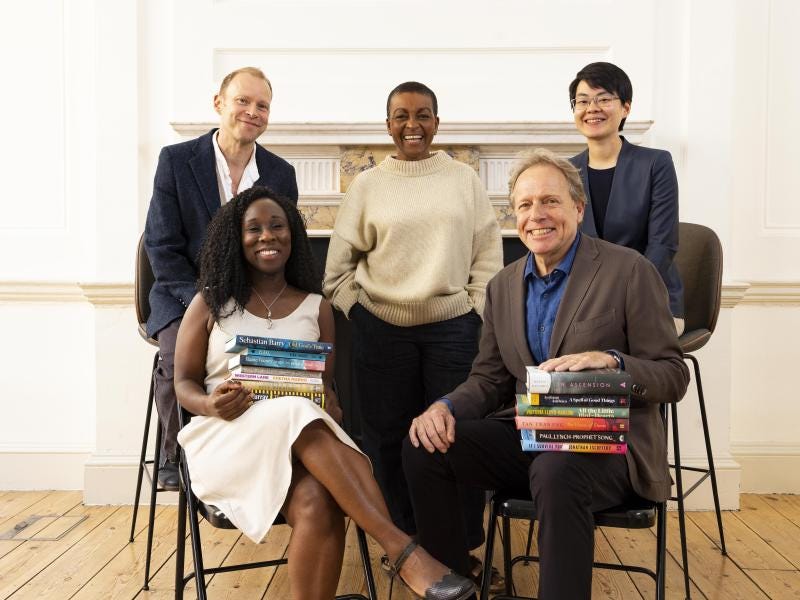
‘Prophet Song follows one woman’s attempts to save her family in a dystopic Ireland sliding further and further into authoritarian rule. It is a shocking, at times tender novel that is not soon forgotten.
‘The prose is a feast, with gorgeous rolling sentences you sink into. Far from didactic, the book warns of the precarity of democratic ideals and the ugly possibilities that lie beyond their desecration.
‘[The book] has one of the most haunting endings you will ever read [and] lives long in the mind after you’ve set it down.’
What has Paul Lynch said about the book?
‘I was trying to see into the modern chaos. The unrest in Western democracies. The problem of Syria – the implosion of an entire nation, the scale of its refugee crisis and the West’s indifference. Prophet Song is partly an attempt at radical empathy. To understand better, we must first experience the problem for ourselves. So I sought to deepen the dystopian by bringing to it a high degree of realism. I wanted to deepen the reader’s immersion to such a degree that by the end of the book, they would not just know, but feel this problem for themselves.’
What have the critics said?
Aimee Walsh, Observer:
‘Told without paragraph breaks, the book has a breathless, claustrophobic atmosphere. Free will and the meaning of liberty are pushed beyond their limits, eroding both to a state of near non-existence. […] Lynch’s message is crystal clear: lives the world over are experiencing upheaval, violence, persecution. Prophet Song is a literary manifesto for empathy for those in need and a brilliant, haunting novel that should be placed into the hands of policymakers everywhere.’
Alannah Hopkin, Irish Examiner:
‘I don’t know when I last read a book that left me as shaken and disturbed as Paul Lynch’s fifth novel. It is a tremendous achievement, telling a dark story of a society’s descent into war that resonates far beyond Ireland. This is one of the most important novels of 2023.
‘Paul Lynch is a fearless writer – unafraid of taking on large themes and tackling them face to face. The story recounts a mother’s experience of life in suburban Dublin, as it is transformed by a tyrannical government into a war zone. While it is Irish in detail, its events recall those seen nightly on the news.’
Melissa Harrison, Guardian:
‘The Irish offspring of The Handmaid’s Tale and Nineteen Eighty-Four, Paul Lynch’s Booker-longlisted fifth novel is as nightmarish a story as you’ll come across: powerful, claustrophobic and horribly real. From its opening pages it exerts a grim kind of grip; even when approached cautiously and read in short bursts it somehow lingers, its world leaking out from its pages like black ink into clear water… Where Prophet Song leads us in its closing pages is shocking, yet grimly inevitable. We would do well not to look away.’
Which writers have influenced Paul Lynch?
In an article for the Booker Prizes, Lynch wrote:
‘There are many supreme writers whose gaze slides effortlessly into the infinite – Woolf, Kafka, Borges and Lispector chief among them. Though for me, Melville, Dostoyevsky, Conrad, Faulkner, and McCarthy form an echoing conversation across time.
‘Such writers in their familial resemblances might better be described as cosmic realism. For they are defined by their cosmic eye, their ability to gaze as though from on high at the human condition in all its agony and confusion and grand gestures, to hold within their gaze not just the table and chairs and the chatter in the room but the fundamental strangeness of our condition – the infinite spaces that enfold us, the eternal truths that define us throughout the ages. Theirs is a gaze that reaches into the farthest reaches of reality and into the very stuffing of what we are. The secrets of the world remain profound but the cosmic writer steps forward to be its interpreter.’
Why does Paul Lynch think Ireland produces so many good writers?
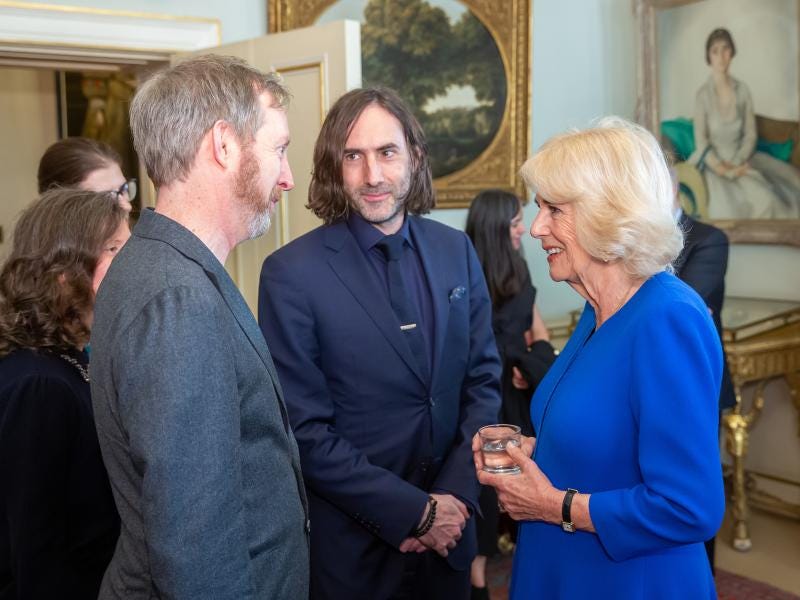
‘None of this would be possible without the support of the Irish state. I received two Arts Council bursaries during the four years it took to write this book.’ In a video interview with the Booker Prizes, Lynch talked about the influence of the great Irish writers of the past: ‘Writers like Beckett or Joyce don’t just produce great works of literature, they transmit into the culture a massive energy and we’re still drawing on that, whether we realise it or not.’
Is Prophet Song really a dystopian novel?
In a video interview with the Booker Prizes, Lynch said:
‘What I wanted to do with this book was dismantle the form of the dystopian novel. I’ve always been suspicious that the dystopian sometimes can be a little too papier mâché. The speculative that’s going on in this book isn’t speculative at all. It’s actually going on somewhere in the world right now. Such a book cannot be speculative at all. It’s actually realism.’
Watch Caitríona Balfe read from Prophet Song
Caitríona Balfe is best known for her leading role as Claire Randall in the internationally successful Starz/Sony series Outlander, for which she has won a Scottish BAFTA, an IFTA and earned four Golden Globe nominations for Best Actress. Watch her read an extract from the novel below.
Have you read Prophet Song, or is it in your TBR pile? We’d love to know your thoughts on the prize-winning novel in the comments below.

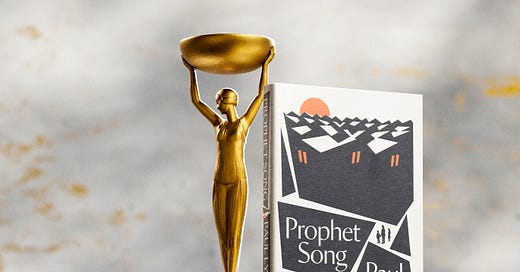



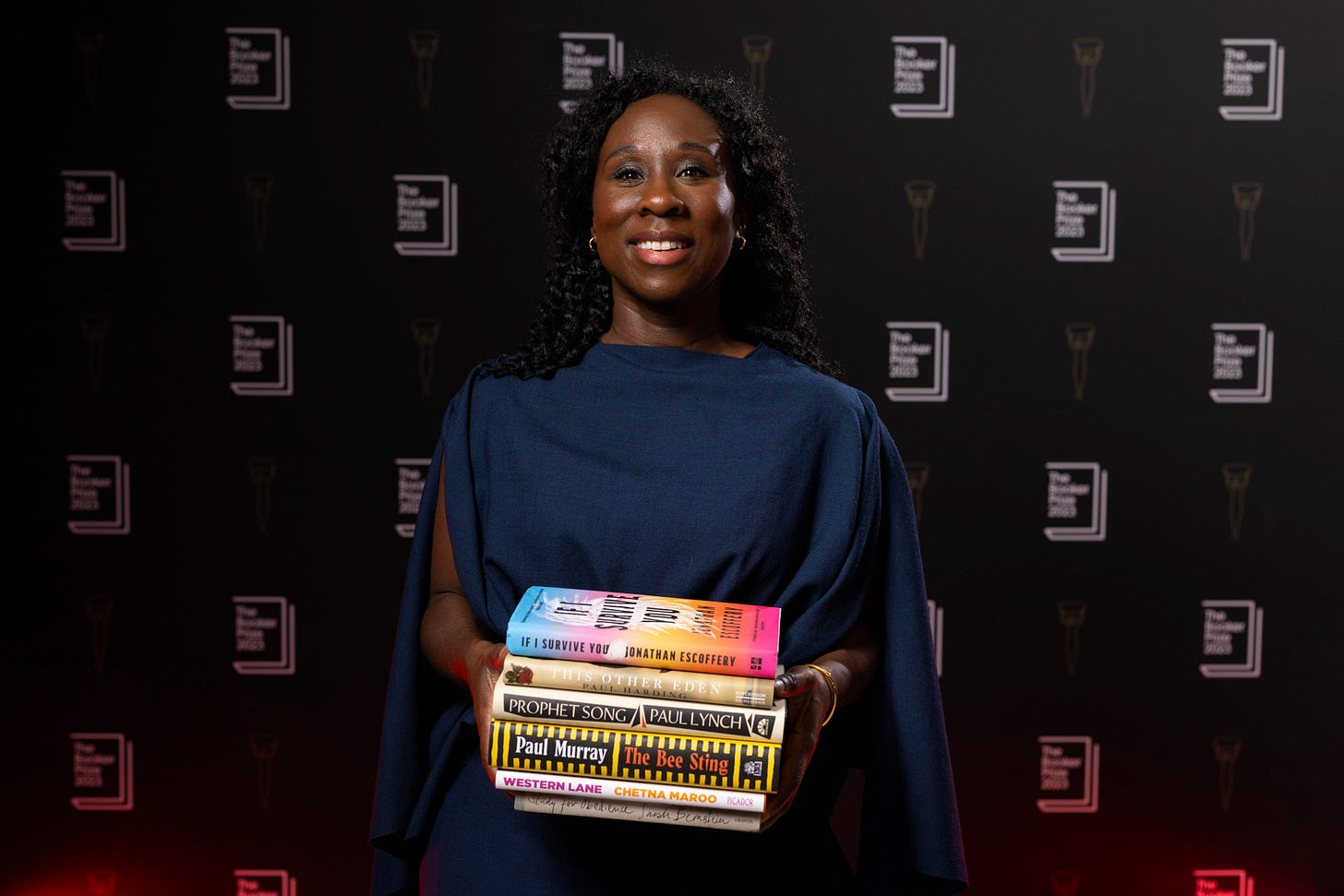
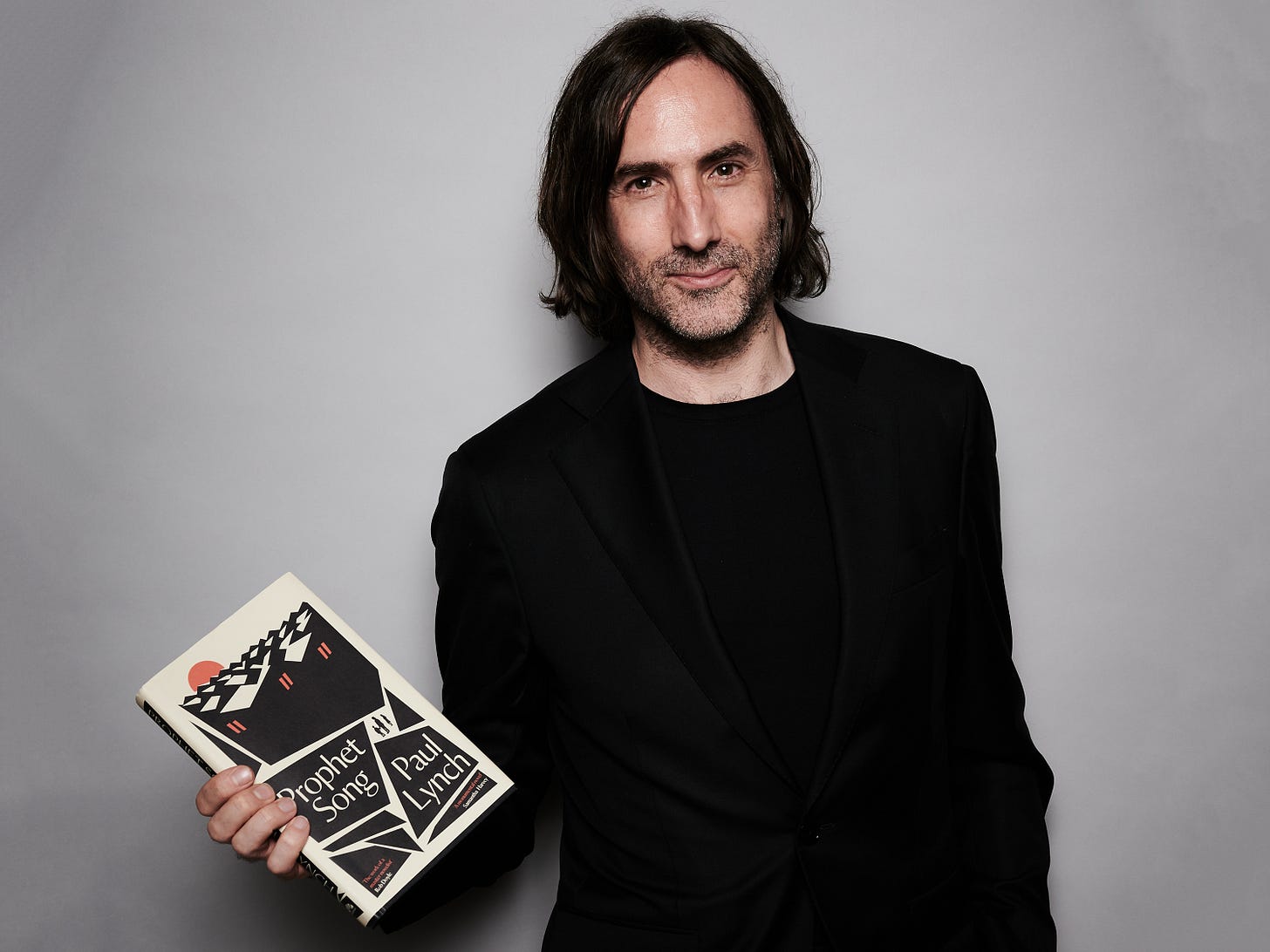
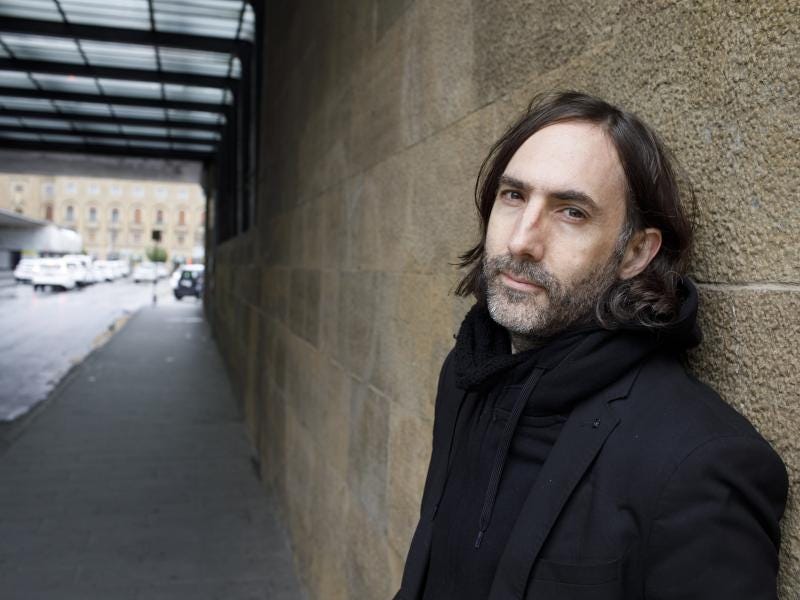
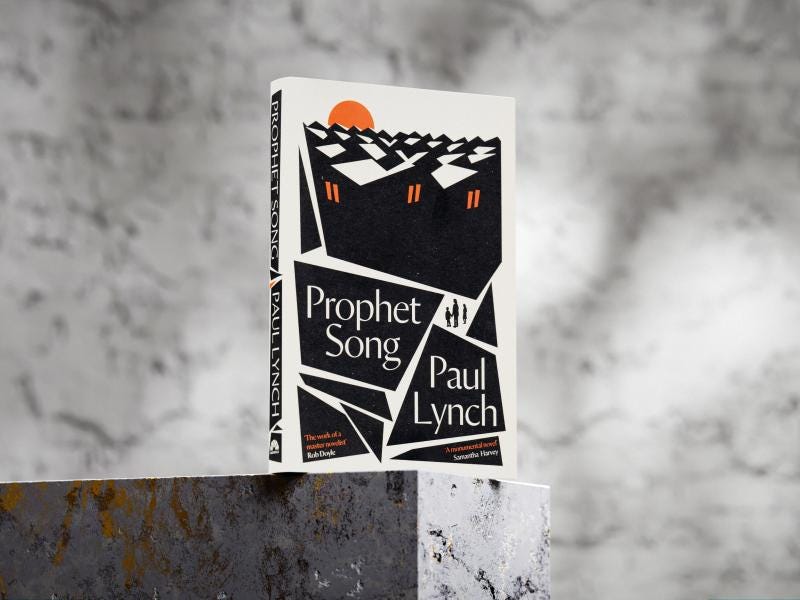
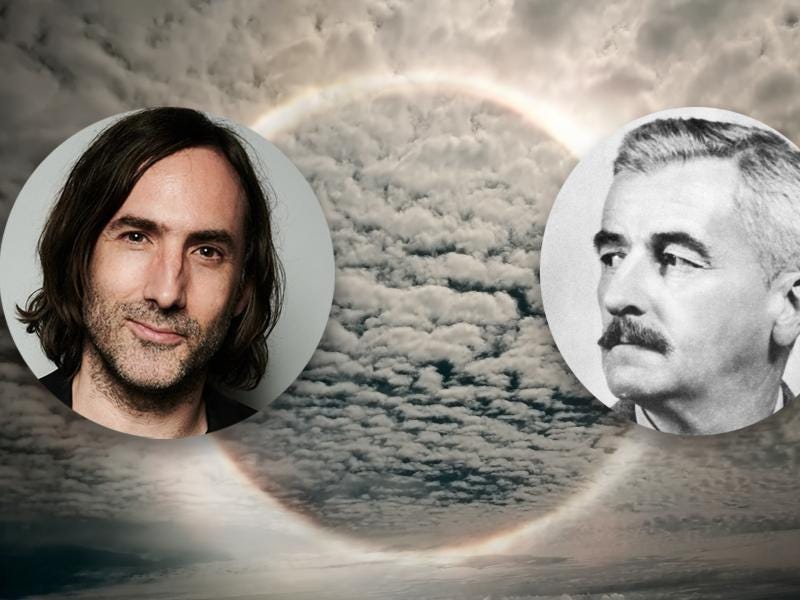
Having been deeply impressed by The Bee Sting, I began Prophet Song thinking that I'd already read the winner. But, from the start this book captured an urgent sense of a developing ugly reality that was too recognisable unfortunately. I could not put it down, reading the second half in one go. I have worked with people coming from such situations, and this was as true to understanding how life had been for them as could be achieved. Imelda
I have not read any Paul Lynch, until I started reading Red Sky in Morning yesterday. He is a wonderful writer, his phrases and Rythm and the choice of words were instantly captivating. I am looking forward to reading Prophet Song once I finish this earlier novel.